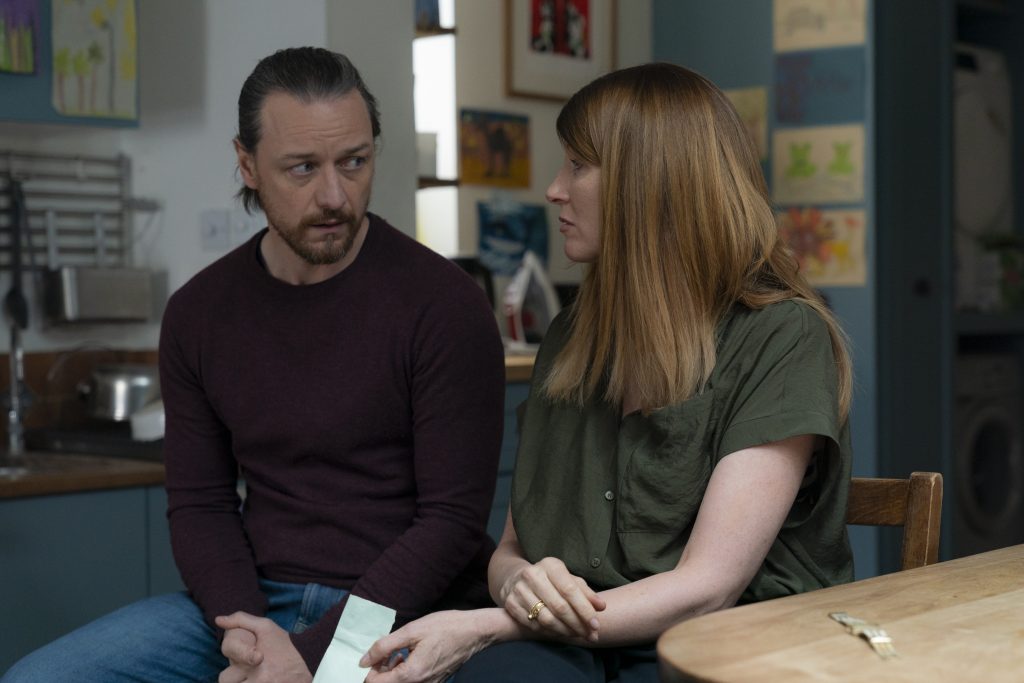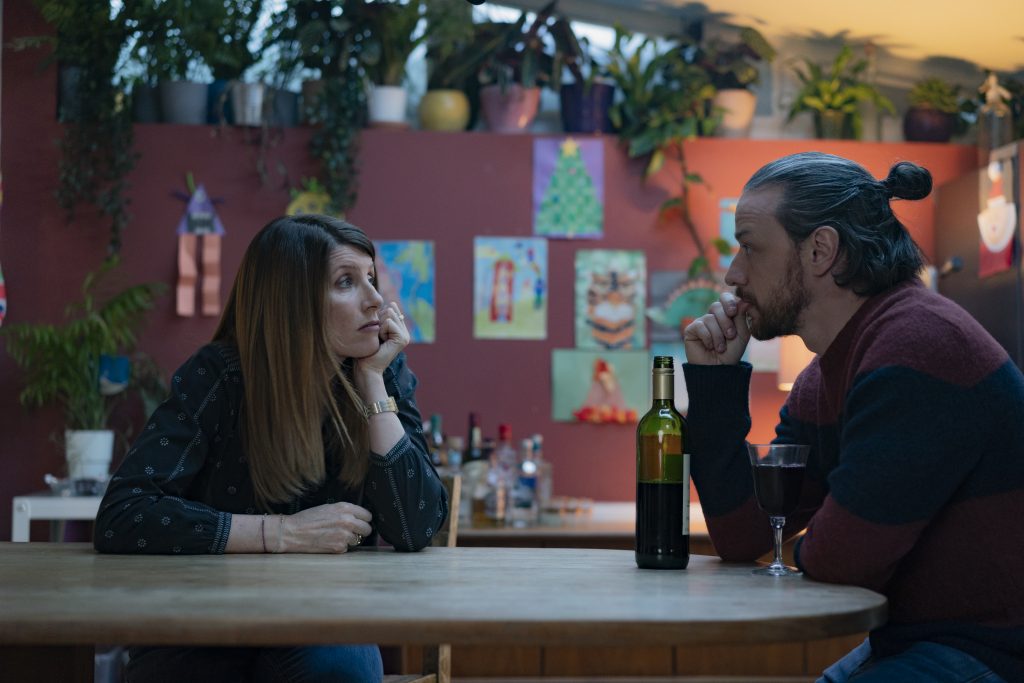comedy, coronavirus, COVID-19, drama, James McAvoy, movies, reviews, Sharon Horgan, Stephen Daldry, Together, United Kingdom
August 28, 2021
by Carla Hay

Directed by Stephen Daldry
Culture Representation: Taking place from March 2020 to March 2021, in an unnamed city in the United Kingdom, the comedy/drama “Together” features an all-white cast of characters representing the middle-class.
Culture Clash: An unmarried couple, who are opposites in many ways, confront issues in their love/hate relationship when they have to quarantine together during the COVID-19 pandemic.
Culture Audience: “Together” will appeal primarily to people who are interested in well-acted movies about love relationships during the COVID-19 pandemic.

The comedy/drama “Together” is a very talkative relationship movie that could easily have been a stage play because the entire story takes place at one house. The movie’s appeal is largely dependent on the talent of co-stars James McAvoy and Sharon Horgan. They are two of the movie’s three cast members who speak. McAvoy and Horgan also have about 99% of the screen time and speaking lines in the movie. And much of it consists of conversations and monologues that are funny, rude, angry and sometimes poignant.
Fortunately, McAvoy and Horgan succeed in making their very flawed characters sizzle with a wide range of emotions that are realistic for a troubled couple navigating their way through a quarantine together during the COVID-19 pandemic. “Together” (directed by Stephen Daldry and written Dennis Kelly) takes place from March 24, 2020, to March 22, 2021, in an unnamed city in the United Kingdom. By the end of the movie, the unnamed, unmarried couple portrayed by McAvoy and Horgan have a reckoning about where their relationship is headed, and they decide if they are going to stay together or not.
The couple at the center of the story are only identified as He and She in the film’s credits. They are both opposites in many ways. He is a businessman who used to be a high-ranking corporate executive and has started his own tech consulting business that is failing when this story begins. He’s politically conservative and hates the idea of government welfare because he thinks people on welfare are lazy. He has a very arrogant and condescending view of people who are working-class and poor, even though he comes from a working-class background in Scotland.
She’s from England and politically liberal—someone whom a conservative would call a “bleeding heart” liberal, although she likes to think of herself as a moderate liberal. She comes from an upper-middle-class background (her late father was a dentist), and she believes that the government and society in general should do more to help poor and disenfranchised people. It’s why she works as a refugee coordinator.
This often-bickering couple has a son together named Arthur, nicknamed Artie (played by Samuel Logan), who’s about 11 or 12 years old. Artie stays in the background for most of the movie. Artie also doesn’t speak until the last third of the film, when the quarantine lockdown has lifted and the COVID-19 vaccination has become available. This family trio lives in a cluttered, upper-middle-class two-story house.
There are two scenes where Artie is briefly shown on a backyard trampoline. The movie quickly shows only person outside of the household: a boy who’s around the same age as Artie and who lives next door. This unnamed boy doesn’t speak in the movie, but he also has a backyard trampoline that he’s seen jumping on at the same time as Artie. Viewers will get the impression that even without a quarantine, Artie is a loner anyway because he and his parents never mention Artie not being able to hang out with any friends during the lockdown.
The beginning of “Together” doesn’t waste time in showing the volatile relationship between these on-again/off-again lovers. It’s the first day of the quarantine lockdown, and they’ve just come back from stocking up on food from a grocery store, where a lot of panic buying was going on. This argumentative couple—who talk to the camera, as if they’re filming video diaries for an audience—can’t even agree on the name their son should be called. He thinks their son should be called Artie, while she prefers Arthur.
He says to the camera, “The only thing keeping us together is our child.” He then says to her about how during quarantine, he’ll miss the routine of leaving the house. “Just saying goodbye to you [to go to work] is the best part of my day!” She snaps back and says to the camera, “Just being in the same room as him is like a sadness and a soul stink both mixed together.”
The insults don’t end there. He says to her, “I hate your face.” She replies, “When I look at you, I get the exact same feeling as my dead dad’s cancer.” They both trade these types of verbal barbs while looking at each other or acting as if the other person isn’t there and talking directly to the camera.
How did these two miserable people end up together? They tell their “love story” in bits and pieces, during their conversations and monologues. Like many romances that turn sour, things started out wonderfully. They had an “opposites attract” relationship where their differences seemed charming to each other in the beginning. And they definitely fell in love.
However, even early on in their relationship, they disagreed and argued over fundamental things. A turning point in their courtship happened when a hipster friend of theirs named Nathan convinced the couple to go on a New Age type of rustic retreat with Nathan and some other people. During this retreat, the participants were required to get up early one morning to harvest mushrooms.
The male partner in the couple got food poisoning from eating the mushrooms. His food poisoning was so severe that he needed hospital treatment. And describing it all these years later, he says it felt like a near-death experience. Because of this health scare, the couple decided to have a child together.
Artie or Arthur is a fairly quiet child who can occasionally be seen eavesdropping on some of his parents’ arguments. They seem to be aware that he listens in on them talking because they sometimes lower their voice when they say things they don’t want their son to hear. And the man in the couple thinks that Artie is a little strange, but when he talks about it with his partner, this father often over-compensates by raising his voice to praise Artie in case the child can hear nearby.
In the beginning of the movie, the man tells his partner about a recent trip to a grocery store, where he wanted to buy aubergines to cook for their son. He saw a grocery store employee with a large stock of aubergines and asked her if any were available to buy. She says no, because another employee who recently got infected with COVID-19 could have handled this produce, and the store is investigating to find out if the aubergines would be safe to sell.
The man in the relationship practically brags with glee about how he verbally abused this grocery store employee when she declined to take £1,000 that he offered to get her to give him one of the aubergines. He says that he called this employee a “big-nosed prick” and a “fucking loser.” And to further demean her, he also said: “This is the reason why you’re stuck in this shitty job, and I’ve got an E-Class [Mercedes] Benz waiting for me outside!” He also said that he dropped all of his groceries on the floor and then walked out.
The man’s partner is so horrified and disgusted by hearing this story that she walks away. It’s meant to demonstrate how callous and condescending he can be. But over time, things happen during the pandemic that teach him some humility and appreciation for people and things that he took for granted. The man in this relationship has a more transformative arc than the woman during the pandemic lockdown.
Throughout this one-year period that’s depicted in “Together,” the couple experiences more ups and downs, including news that a few people they know have been infected with COVID-19. They argue some more, make up, and then argue again. It seems to be a pattern in their relationship that gives them a lot of stress, but it’s something that they’re oddly comfortable with because that’s all they know in how to communicate with each other.
Artie has only one grandparent: his mother’s widowed mother. The parents of Artie’s father are deceased. Artie is very close to his maternal grandmother, who needs nursing care and cannot visit during the quarantine lockdown. Artie’s mother is very worried about what will happen to her mother, who has another daughter who also lives in the United Kingdom. A decision is made on whether or not the grandmother should continue to receive care at home or should be moved to a nursing care facility.
Although none of this couple’s relatives is seen in the movie, the types of relationships that Artie’s mother has with her sister and mother have a deep emotional effect on her. It’s not stated if the man in the relationship has any living relatives. This movie’s lack of a family background for the male protagonsist is a minor screenplay flaw that can easily be forgiven because his character’s personality is so vivid (as unlikable as he can be) and very realistic to how a lot of insecure people behave.
The woman in the relationship isn’t a saint either, since she and her partner say some awful, hateful things to each other. Her main personality flaw is that she doesn’t like to show vulnerabilities and puts up a front that she can handle anything at any time. And that “stiff upper lip” façade might come crashing down on her.
One of the criticisms that “Together” might get is how the couple’s son is mostly in the background during this story of a family that’s supposed to be in lockdown together. The parents do seem self-absorbed, but they are not neglectful, since there are scenes where they interact lovingly with their son. However, it’s easy to see why the filmmakers didn’t want Artie/Arthur to say or do much in this story, because the movie’s focus is on how these squabbling parents are dealing with their own issues that have nothing to do with their son.
Because these two adult characters are front and center for the entire movie, viewer enjoyment of “Together” will be affected by how much someone is willing to spend 92 minutes going on a talkative roller coaster ride of a couple whose relationship always seems on the verge of collapse. Fortunately, Kelly’s witty screenplay gives McAvoy and Horgan an ideal platform to showcase their considerable acting chops. It’s a ride that is sometimes uncomfortable, sometimes amusing, but it’s definitely not boring.
Bleecker Street released “Together” in select U.S. cinemas on August 27, 2021. The movie is set for release on digital and VOD on September 17, 2021. BBC iPlayer premiered the movie in the United Kingdom on June 17, 2021.
